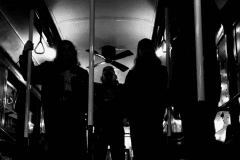MACROSCOPE (Mayday Games)
Some games aren’t about brilliant strategies or tactical planning. Some games are just about having a good time with friends and family. Mayday Games’ Macroscope falls distinctly into this category. It’s a very simple guessing game for ages six and up that tasks players with identifying partially obscured images.
The Macroscope houses hundreds of images to be discovered and rediscovered throughout many, many play sessions. Gameplay is very straightforward. Players take turns rolling the dice and removing numbered tokens that match their rolled numbers from the top of the Macroscope. Doing so reveals tiny sections of these images. Players then must decide whether to take a guess at the image or pass to the next player. The goal is to guess correctly and collect crystals for accurate guesses. Incorrect guesses cost crystals, while correct ones earn them. The fewer number of tokens removed before a correct guess the more crystals a player earns. Players may also challenge others’ guesses by wagering some of their crystals. This continues for ten rounds at which point the player with the most crystals is declared the winner.

Probably the coolest thing about Macroscope is the actual Macroscope. It provides the housing for the 200 double-sided cards that feature black and white line drawings to be identified. The 12 tokens (two of each numeral from one through six) fit nicely on its top, and the whole construction seems sturdy. It pieces together easily and feels quite hardy for something made entirely of cardboard. The Macroscope itself also ups the level of fantasy with a steampunk aesthetic boasting plenty of decorative lenses and clockwork. The cards, on the other hand, are very thin and delicate. Adults removing and replacing cards from the Macroscope is recommended if playing alongside children.
Macroscope isn’t a particularly challenging game or one that will test your mental acumen. It’s great for kids and good for adults. The designers did admirable work at revealing just enough of an image with each token’s removal to narrow one’s options without immediately disclosing the nature of the picture. The risk/reward element of balancing the desire for making wild guesses with waiting for sure things adds a nice bit of depth to an otherwise incredibly basic game.
Whether being used as a semi-educational tool for children or a drinking game for adults who want to act like children, Macroscope provides a solid half hour of laid back fun. It’s not going to replace your Eurogames or role-playing sessions, nor does it want to. Macroscope does exactly what it needs to do. It provides short bursts of gaming enjoyment for anyone with enough imagination to give it a go. (Mayday Games) by Kris Poland







Social Media